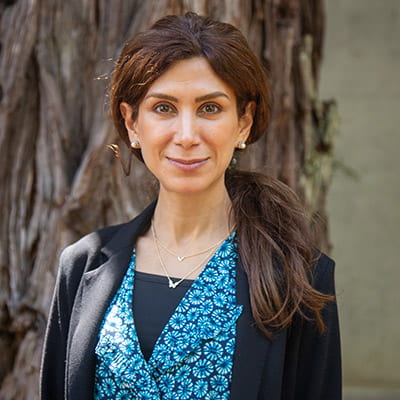Throughout Baskin Engineering Climate Week, faculty and alumni delivered open climate talks, offering expert insights on topics such as genomics for biodiversity preservation, sustainable agricultural technologies, innovative approaches for wildfire monitoring, and the latest advancements in green computing.
Carbon in motion: revealing the rhizosphere’s hidden role in climate and global carbon
Shiva Abbaszadeh, Associate Professor of Electrical and Computer Engineering
The rhizosphere—the zone where plant roots, microbes, and soil interact—is a key player in the global carbon cycle, capable of both stabilizing and releasing soil organic carbon (SOC). Understanding the paradox of how roots can both sequester and destabilize carbon is crucial for enhancing soil’s potential as a carbon sink. This research uses high-resolution dynamic positron emission tomography (PET) imaging and isotope tracers to visualize and quantify carbon movement in undisturbed soil systems. By revealing the pathways of root- and microbe-driven SOC turnover, these insights support efforts like the Carbon Negative Energy Earthshot and improve global soil carbon models.

Teaching climate change from a behavioral science perspective to engineering
Les Guliasi, Baskin Engineering lecturer
Les Guliasi, known for his Bending the Curve: Climate Action For All course, brings a social scientist’s perspective to engineers. It is designed to appeal to all students from all departments who care about climate change and environmental and social justice and want to learn practical steps for making a positive difference.

100 year waves in Santa Cruz – analyzing extremes
Ben Ticknor, Statistics Ph.D. Student
Graduate student Ben Ticknor’s research is requantifying what a 100-year wave looks like in Santa Cruz and other worldwide coastal locations, what has gone wrong with our previous estimates, and how we might expect things to change in a warming world.

Soil to solar: sustainable energy for the next generation of computing
Colleen Josephson, Assistant Professor of Electrical and Computer Engineering
We need affordable and innovative approaches to assist in tackling global-scale problems like climate change. The area of sustainable computing has been growing in popularity. With recent advances, much attention has been focused on applying techniques like Artificial Intelligence (AI) to improve climate models, or improve efficiency and reduce resource consumption in various sectors. This is computing for sustainability. Just as important, however, is sustainable computing, where the focus lies on making sure technology itself has a minimal negative impact. This talk will explore both sides of this duality, first beginning with wireless sensor networks that help us monitor and conserve limited resources, then transitioning to how we can design energy harvesting and management systems to make computing of all scales—from the humble microbe, all the way to megalithic datacenters—more sustainable.

Internet of Things for wildfire monitoring
Katia Obraczka, Professor of Computer Science and Engineering
Responding to the increasingly frequent, intense, and destructive wildfires in California, Professor of Computer Science and Engineering Katia Obraczka and colleagues have developed a resilient, drone-assisted IoT network, which adapts to the conditions in the environment providing data to web-based decision-support tools that inform stakeholders and the public about wildfire risks in real time.

Injecting a healthy dose of “WHY” into the “HOW”
Weston Mossman, Baskin Engineering Alumnus (B.S., Computer Science & Game Design)
A first hand account of a BE alum Weston Mossman’s rocky 10-year transition from a lonely software engineer without a purpose to an empowered creator building change and community around what matters, both in our hearts and on our planet.

Sustainable computing for a sustainable society
Abel Souza, Assistant Professor of Computer Science and Engineering
As society discovers more applications and uses with computing, its growing energy demand and the resulting footprint are raising concerns about its environmental sustainability. From the electrification of the residential, industrial, and transportation sectors to the growth of AI and data centers driving energy needs across various sectors, accurately accounting for and acting upon the factors contributing to the growth of consumption and resulting GHG emissions becomes imperative.
Souza will explore strategies for elevating carbon as a primary metric in the design of carbon-aware systems. The way forward lies in enabling users to adapt to the availability of low-carbon energy, a capability currently unexplored due to the limited visibility and control over energy demand and consumption information. Souza’s argument centers on the idea that smart systems should expose the energy system, granting people the visibility and control necessary to create their own energy and environmental policies, all while mitigating inconvenient factors associated with their daily routine. He will delve into practical abstractions, address associated limitations, and discuss a path forward to handle today’s constraints, paving the way for a zero-carbon society.

Technologically enhanced informal learning for climate resilience
Linda Hirsch, Baskin Engineering Postdoctoral Researcher
Climate change has increased the frequency and intensity of natural hazards globally, strongly impacting the lives of all people living in risk areas. While this is a new reality that people have to get used to, it remains a challenge to increase awareness of local risks, support relevant adaption, and upskill locals to be able to prepare, deal with, and bounce back from natural hazard impacts. In this talk, Dr. Hirsch will go more in-depth about the role of Human-Computer Interaction and informal learning in this context, as well as the challenges of conducting research in natural hazard-prone environments.

Can evolution save species from climate change?
Malin Pinsky, Associate Professor of Ecology and Evolutionary Biology
Learn how and why evolution might be able to rescue some species from climate change. Understand why evidence from marine species where evolution over just a few dozen generations may have done just that, and how ongoing research in UCSC’s watery backyard is helping us understand the role of rapid evolution in saving the giants of the sea.

